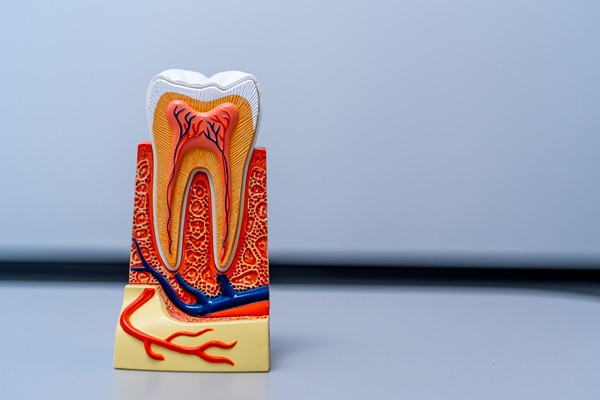Root Canal Infections: The Symptoms and What You Can Do

Root canal infections occur when bacteria reach the central canals of your teeth due to exposure from taking a blow to the mouth or tooth decay. A root canal is a procedure performed for the purpose of repairing or salvaging a seriously decayed tooth or a tooth that has been severely infected. During a root canal procedure, the tooth’s nerve and pulp are extracted before the tooth’s nerves, and inner area is properly cleaned, dried and sealed. Root canal infections should be treated as soon as they are diagnosed before the harmful bacteria penetrate through your tooth’s soft tissue, into the inner nerves and chambers of the tooth.
Common root canal infection symptoms
You have a hunch, but how can you tell that a root canal procedure is needed? One thing you can do is look for the symptoms of a root canal infection. These symptoms include the following:
1. Sensitivity to temperature
One of the first signs is temperature sensitivity when your teeth are exposed to hot or cold beverages and solid foods. The discomfort you may feel when your teeth are exposed to such temperatures is as a result of your teeth’s nerve endings being presented after the enamel gets eroded by bacteria.
2. Persistent toothaches
Having sensitive teeth when exposed to hot or cold foods is one thing, but if the sting persists long afterward, there’s a high chance your root canal is infected. You may either experience the ache as a throbbing sensation or as a persistent, intense pain. Either way, it is a sign that your root canal has been infected and action needs to be taken immediately.
3. Darkening of the tooth
When you notice a discolored tooth in your mouth, it is a sign that you might have a dead tooth. The discolored tooth is a result of poor blood flow caused by tooth decay, root canal infection, and physical trauma.
4. Bad breath
A sure tell-tale sign of a root canal infection is terrible mouth odor. Bad breath comes about as a result of harmful bacteria breaching your teeth’s enamel and entering the root canal. Once the bacteria penetrate the tooth, the resultant infection leads to the emission of awful mouth odor.
5. An abscess
When a root canal infection is left untreated, puss known to go hand in hand with an abscess may begin forming underneath your gums. One side of your cheek may become tender and swollen leading to a lot of discomforts.
What to do
Skipping a root canal procedure could lead to the tissue surrounding the teeth and all over the gum getting infected. Once this happens, an abscess may form, creating an ugly sight and smell. The best thing to do if you have any of the symptoms above is to make an appointment with your dentist so that they can diagnose the problem and decide the best course of action.
Have more questions about a possible infection after having a root canal? Contact our office, and we can answer any additional questions you may have. We can also help in guiding you to make the best decision for your teeth and oral health.
Request an appointment here: https://santarosaendodontics.com or call Santa Rosa Endodontics at (707) 409-1177 for an appointment in our Ukiah office.
Recent Posts
A non-surgical root canal is an endodontic procedure known for preserving a tooth affected by severe decay, infection, or trauma, all without incisions in the gum tissue. Many patients become anxious when they hear the term "root canal," yet modern techniques can provide a gentler experience than expected. Endodontists often recommend this treatment when a…
A general dentist can perform basic tasks in tooth care, such as X-rays, oral examinations, filling cavities, and extractions. However, patients may be referred to an endodontist for more complex work, such as certain root canals. When is it likely for a dentist to refer a patient to this dental specialist?While a filling can fix…
Root canal treatment is often the first line of defense for treating teeth with compromised pulp chambers. The pulp chamber is the innermost layer of a tooth, and it stores nerves, blood vessels, and connective tissues. The chamber is sealed off from the rest of the tooth to protect it against bacteria and other irritants…
A root canal can preserve and strengthen a severely damaged or infected tooth. When seeing a root canal dentist, asking informed questions can provide clarity, ease concerns, and improve treatment outcomes. Understanding the procedure helps make the experience more comfortable and ensures you are well-prepared for each step.While each patient's situation is unique, the following…


